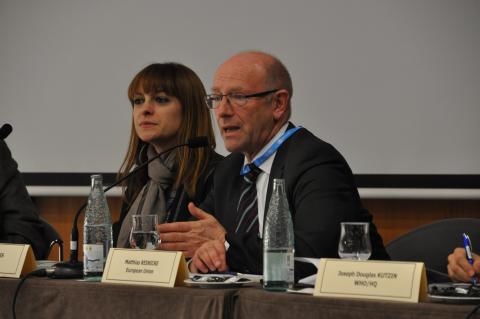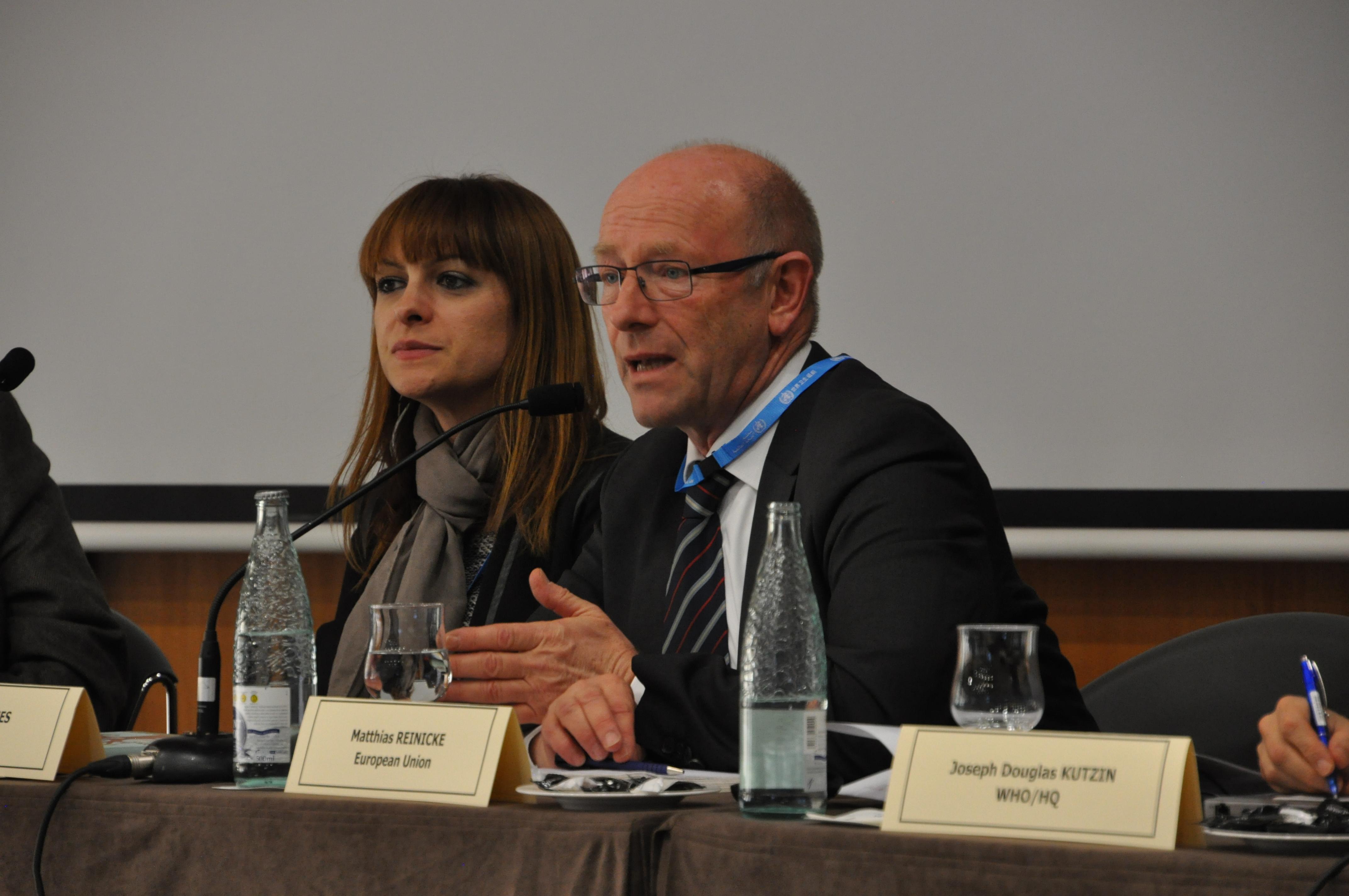
This article was written in collaboration with Dr Matthias Reinicke, Health Sector Advisor at the Directorate General International Development and Cooperation, EuropeAid, Brussels.
“The EU-Lux-WHO partnership is a cutting-edge programme, which, despite its complexity and challenges, has already achieved a lot – and with relatively little money”.
It was with this encouraging remark that Dr Matthias Reinicke, Health Sector Advisor at EuropeAid (European Commission), opened the 4th Annual Technical Meeting of the European Union, Luxembourg and WHO Universal Health Coverage Partnership (UHC-P), held in Barcelona on 1-3 March 2016.
The European Union has been the UHC-P’s main supporter since its inception in 2011, and recently reaffirmed its commitment with the approval of fresh funding for the third phase of the programme, which began in January 2016. Luxembourg also joined the partnership as a donor in 2013.
Speaking with Dr Reinicke on the sidelines of UHC-P’s 4th Annual Technical Meeting, Community Systems Foundation (CSF) asked Reinicke to explain the EU’s motivation for renewing its support for the UHC-P.
The path to funding a third phase was not without its hurdles, according to Reinicke, but “in the past two years, WHO has increasingly demonstrated its capacity to work in an integrated manner” to convene stakeholders and facilitate policy dialogue on universal health coverage in target countries.
Reinicke also pointed to the UHC-P results showcased at its 2014 Annual Meeting in Hammamet, Tunisia, which Reinicke explained provided a platform for “follow-up discussions with WHO and EU delegations in the partner countries on the programme’s added value and impact, [making] it clear that it was worth funding a third phase”.
One of the programme’s first and probably best-known success stories, according to Reinicke, came from its work in Tunisia, where the government asked WHO to support the Ministry of Health in coordinating the country’s health sector reform through a highly inclusive and participatory policy dialogue process.
Now four years into the programme, the great news is that similar success stories are emerging from many partner countries: “In Togo, for example, the health financing discussions under the UHC-P have helped introduce the sin and telephony tax”, says Reinicke. Across partner countries, the programme has contributed significantly to the development of new health policies, strategies and plans, even where complex political and societal challenges compete for decision makers’ attention and could otherwise slow progress: “Even in countries where we think that this is almost a ‘mission impossible’, such as in Yemen, the UHC-P was able to take the policy dialogue forward and down to the district level”.
The UHC-P’s focus on promoting multi-stakeholder dialogue is seen as another success and added value by the EU: In the wake of the Ebola outbreak in Sierra Leone and Liberia, WHO played a key role in widening the policy dialogue to include civil society representatives, which helped to combat some of the myths and rumours circulating in affected communities about how the disease was spread.
According to Reinicke, the UHC-P also provides an opportunity to complement the EU’s bilateral health programmes in partner countries with valuable WHO expertise and leadership in the area of policy dialogue and health systems strengthening. For example, following the EU’s recently launched health programme in Morocco (March 2016), a recipient of UHC-P support since January 2016, fruitful dialogue between the WHO Country Office and the EU delegation has already been initiated to ensure the programmes take a complementary approach to supporting policy dialogue and health systems strengthening in country. The same was true for the EU’s bilateral health programme in the Ukraine.
Reinicke also welcomed the fact that WHO had invited JICA and the GIZ as observers to the UHC-P’s 4th Annual Technical Meeting – especially in light of WHO and Germany’s new joint global initiative “Healthy Systems – Healthy Lives”, launched at the 2015 G7 Summit, where global leaders committed to assist 60 developing countries to strengthen their health systems. Aimed at bringing together global health actors for a coordinated, effective and measurable effort to strengthen health systems, Reinicke believes the new initiative could significantly benefit from strategic coordination with the UHC-P.
The importance of strategic coordination, particularly among donors, was a key concern raised by WHO country offices and ministries of health present at the 4th Annual UHC-P meeting – especially with regard to the so-called “vertical approach” taken by many global health initiatives, which can limit efforts to build integrated service delivery systems and monitor health outcomes accurately and consistently. CSF asked Reinicke about the role the EU could play in facilitating coordination at country level, especially among the global health initiatives receiving the lion’s share of EU global health funding.
Reinicke explained that the EU would continue to push for an integrated and horizontal approach to health sector assistance in partner countries, including through its membership in the constituency groups of Gavi and the Global Fund. Both groups have new health systems strengthening “windows” that could be utilized to facilitate improved coordination and cooperation. The WHO’s role as convener and co-facilitator of health policy dialogue, as strengthened under the UHC-P, would be an important asset in this context.
Asked to summarize the EU’s main expectations for phase 3 of the UHC-P – and the possibility of supporting the programme beyond 2020 – Reinicke said: “I hope that this programme can demonstrate what has been said throughout this meeting: that it has moved from the planning stages towards the operationalization and implementation of activities, by making achievements visible and showing on-the-ground improvements in district health services, health information, human resources for health, and public financial management – not least in order to make it easier for WHO to lobby for more funding for the programme”.
Dr Matthias Reinicke is a trained physician and holds post-graduate specialisation in international health. Dr Reinicke has worked for thirty years in Africa, Asia, Europe and the United States in the fields of international health policy, health service delivery and health systems strengthening; he has held previous positions with institutions including the World Health Organization, European Commission and other bilateral government and non governmental organisations.
